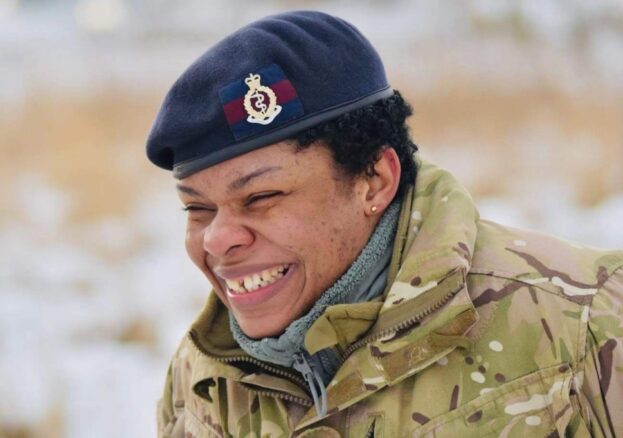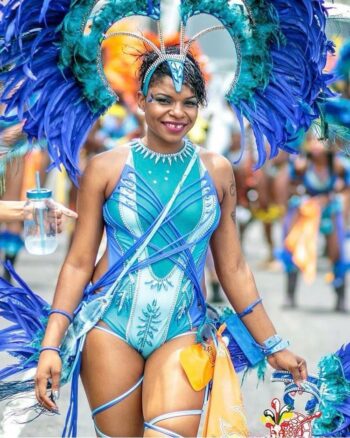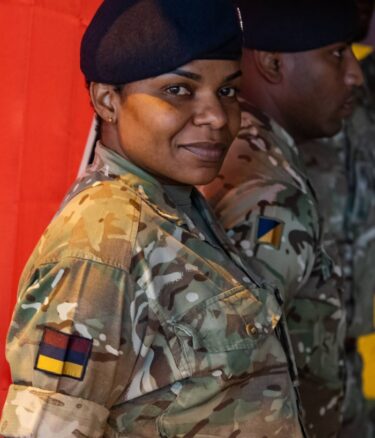
How do you stay connected to your culture when you live and work in a different country and wear a uniform every day? This was the challenge for Sergeant (Sgt) Cyntica Herbert-Fraser, who joined the British Army in 2009 from St Vincent.
“Carnival culture is a big part of my being. Everyone thinks of Brazil when they think of Carnival, but it’s also a big part of the history of slavery – black people used their old clothes to celebrate their culture. And now we’ve modernised it,” she explained.
As well as having a full-time career in the Army, she owns and manages a St Vincent-based Carnival band – Ahdrenalin XO – alongside her husband. They work with designers to come up with a different concept and attention-grabbing costumes each year and provide paying participants with the full Carnival experience. Although the band parades mostly in St Vincent and the Caribbean, they have also brought Ahdrenalin XO to the Notting Hill Carnival in London.
She also presents Carnival culture at annual regimental cultural days. “I show off the costumes, music, food – everything. I joined the Army’s Multicultural Network in 2017 and have been part of the Committee ever since, promoting inclusion and diversity.” This often takes place around Black History Month, involving conferences and training for the Military and beyond. “I recently attended one for officers in training at the Royal Military Academy Sandhurst and one for Home Office staff in central London. I shared my journey, speaking about my lived experience in the military as a female Foreign and Commonwealth soldier.”

Her Army experience saw her posted to Germany as a Combat Medical Technician after her Basic Training to become a soldier, before moving back to the UK in 2014 to serve as a medic for various different regiments including logisticians and the Household Cavalry. She’s now responsible for nine medics as the Medical Sergeant at the Army Training Centre Pirbright Medical Centre, where thousands of new recruits are trained each year.
She also makes sure that new Foreign and Commonwealth (F&C) soldiers into the Army have the support they need.
“I’m part of the Non-UK National Committee and we provide new recruits with ‘nurturing sessions’ to help guide, inform and educate them about the what the Army is like and what is expected of them. It’s a big culture shock if you have come from a different country – you have to adapt to the food, weather, and prices, and there’s still a language barrier. It’s a challenge before you even step inside the camp gate,” she explained. “These sessions provide them with the insight not only on what’s available and how they can support each other, but also how to advance their careers and how to navigate immigration issues for partners and children.”
This was a big concern for Sgt Herbert-Fraser, who had a four-year-old and a two-year-old when she first started Basic Training. “I had to leave them behind with family when I first came over. When I joined, I didn’t have anybody in front of me giving me the information I needed, there was no familiar face I could go and talk to about things,” she said. “I was crying every night because my kids were back home. I really struggled. But this is what drove me on and made me want to not just pass the training, but to excel and achieve all I could. I was motivated to do it for them.”

Sgt Herbert-Fraser aims to be that person she needed during Basic Training, to today’s new recruits. “I attend their passing out parades to show my support and celebrate their achievements. I also invite the High Commissioners of the nationalities that are graduating to attend the parade – not only is it a proud moment for them and their country, but sometimes the soldiers don’t have any other family or friends from back home able to come, so it provides a link,” she explained. “The High Commissioners tend to keep in contact with them and can provide support if they have any issues too.”
Her initial motivation from 14 years ago is still there and Sgt Herbert-Fraser intends to stay in the Army and achieve promotion to Warrant Officer Class 1 – the highest non-officer rank. “I really want to become a medical practice manager – but I also like talking to people through my work with the new recruits so I’m also looking at the engagement route as well.”
As the largest provider of apprenticeships there is an opportunity to be paid £21,000 as you learn a skill.
Army Engagement: https://jobs.army.mod.uk/engage/
